Food to go is the third most popular shopper mission in UK c-stores, with 13% of customers coming in for a quick bite to eat, claims the Association of Convenience Store’s Local Shop Report 2016. What’s more, HIM Research & Consulting predicts that the food-to-go mission, which was worth £4.8bn within the convenience channel in 2015, will grow to £7.8bn by 2020. With such tantalising figures, it’s no wonder plenty of retailers have developed an appetite for the category, with the Local Shop Report stating that 13% of retailers have a hot food counter, while 10% have a food preparation area. Convenience Store speaks to six retailers about their recent food-to-go investments.
The Deli at Maloney’s Maloney’s
Budgens, Ascot, Berkshire
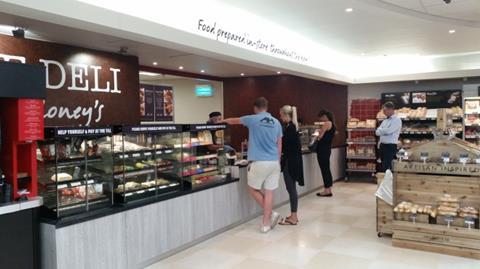
Vince Maloney is hoping that the recently-upgraded eight-metre food-to-go counter at Maloney’s Budgens will lead to a 20% sales increase, working closely with Country Choice to design the counter’s latest incarnation.
The firm’s senior corporate account manager Ainsley Jones explains that the impressive counter had humble beginnings. “Three-and-a-half years ago it was one serve-over unit with a deli offer,” he recounts. Over time, the offering grew with the addition of freshly-made baguettes, bain-marie carts serving Pasta Pronto and Tuk Tuk Asian rice and noodle meals, plus burger options.
“Vince’s food-to-go counter was a victim of its own success,” says Stephen Clifford, head of marketing at Country Choice. “As it grew over the years, we added in different areas and it was all piecemeal, so we sat down and said let’s give it a makeover.”
Marketing controller Heidi Jackson concurs: “There was a lot of sub-branding going on and you end up with a disjointed offer and customers get confused.”
A smart black slate surface now runs the length of the counter, while a large back board carries ‘The Deli at Maloney’s’ branding. But the revamp wasn’t just a case of creating a more uniform brand. The counter is now much more operationally efficient.
“Before we could do only pasta Monday to Weds and then burgers Thursday and Friday,” says Vince. “Now we can offer them all every day, as well as hot fillings for jacket potatoes. We’ve also added two extra display units. Before, breakfast baps would have been placed alongside pasties, whereas now they have their own units and we can offer a wider range and products have stronger standout. There’s room for more premium options, too.”
What’s more, the new counter offers the flexibility to offer different dishes at different times of day. “In the mornings it can offer bacon, sausage and egg, and in the afternoons we can do pasta and curry dishes,” says Clifford. “We have also moved the coffee machine alongside the counter to make it part of the run, and added an improved pastries offering.” This includes premium sausage rolls with flavours such as pork & chorizo, chilli beef & pork, cheese & pickle, as well as monthly specials.
“The core range is always 80%, with 20% based on your individual customer profile,” says Vince. “We have an affluent customer base, so within that 20% there’s pasta and rice - we’ll sell 40 dishes a day, and burgers and hot dogs, which we sell 25 of.”
In addition, the counter sells between 160 and 200 baguettes a day.
The centre of the counter now has an opening for staff to serve customers directly, rather than having to hand products over the display units. Deli manager Sharon Allen-Turner is delighted with results. “It’s been better structured to make it easier for us to work,” she says. “You can still get your grab & go, but it’s a little more bespoke. It’s much more customer friendly.”
She explains that there are seven members of staff, four part-time and three full-time. “We get in at 5.45am and the deli is open from 7am til 7pm,” she says.
Vince is now looking for an additional member of staff to help with the busy 10am til 3pm period. “The overall margin is 39%, but this is labour intensive,” he says. “You have to try to balance the books - grocery is 24% and some areas are much less.”
Daily Deli
Spar Parkfoot, Kent
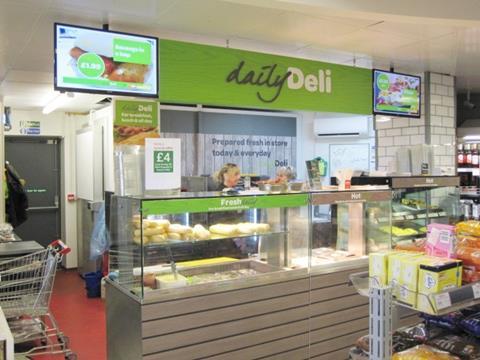
David Charman has found that allowing skilled catering staff to take responsibility for the food-to-go area pays dividends, while a recent investment of £20,000 has taken the offering to the next level.
David explains that he started the food-to-go operation three years ago, but concedes that with a butchery and fish counter in full swing, there was a point when he lost his passion for it. “If I’m honest, I ran out of ideas and capacity to do anything radically different.”
But while David was lacking in the ideas department, he had two members of staff who were more than ready for the challenge. Coming from catering backgrounds, they were able to breathe new life into the offering by preparing their own dishes from scratch.
“Our bakery manager Vicki Swift utilises products that are going out of date to make new dishes, and she will cook things that are out of date and sample them for people,” says David. “Most stores run at 2-3% wastage and we’re running at 1%. There’s no point in throwing something away if you can cook it and give it to somebody.”
Vicki, who previously worked as a chef at a golf club, explains how she cuts down the store’s waste: “I’ll look through the reduced items and cook something up – for example, we had chicken the other day so I made chicken fajitas, and I did a roasted veg sandwich filling with feta and brie.”
She also cooks chilled pies that are about to expire. “We have award-winning chilled pies, but they only have five days’ shelf life and they don’t always sell,” says David. “We can cook a pie that cost £6.99 retail and cook it and cut it into six and sell it for £1.25 a slice and make more. Food to go is a highly profitable part of our business.”
Since the food-to-go team started making their own dishes, sales have rocketed 40%.
But the appearance of the counter was letting the store’s food-to-go offering down. “We’re supplied by Country Choice and the branding was Bake & Bite, which has never really quite worked,” he explains. “It didn’t say the same as today’s Costa/Starbucks environment.
“We wanted to adopt branding that really meant something. I heard about Spar’s Daily Deli a year ago and thought ‘this is what we should be doing here’. It brings everything together and locks it all as one.
“It papered over the cracks where we’d bought things that hadn’t really gelled. At the same time, we put in TV screens to advertise our products.”
He also installed a new freezer room to improve operational efficiencies, and added some extra lines. “We’ve expanded the food–to-go range so we now do hot potatoes and paninis, too,” says David. “Since the branding of Spar Daily Deli it is up a further 10%.”
Vicki is pleased with the changes. “Before we got the Daily Deli branding the area was a lot smaller, with a wall and sink behind. We had to go to the back kitchen in another room. Now we have our own walk-in freezer to store items we’ll use throughout the day. The customers definitely think Daily Deli looks a lot better.”
David now has high hopes for the future. “You have to be prepared to spend when you need the investment,” he says. “We’re touching £6,000 a week now, which is good, but I can see that growing. The next stage would be producing our own-branded Daily Deli sandwiches.”
Londis
Blean, Kent
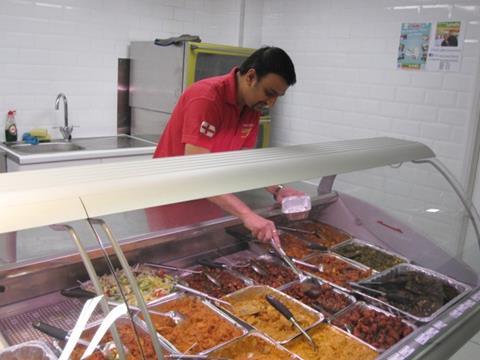
Binny Amin, of Londis Blean, Kent, happened on his current food-to-go offering by accident. “The original plan was to have a proper deli counter with hams, cheeses, pies and pasties,” explains Binny. “The curry happened by mistake. We ordered some curries in for lunch from the local area and they weren’t that good.”
Realising that there was a gap in the market for authentic Indian dishes, Binny started researching curry houses. “We thought we’d take a gamble, so we looked at what we could offer. Chak89 is an awesome restaurant in Mitcham. We started with eight dishes – a few traditional and a couple more adventurous, such as Karahi chicken. It’s been so popular we can’t keep up! The curries last five days, but they’re selling out every 2-3 days. It does about £3,000 every week.
“We’ve started putting some more popular orders in ready-to-heat boxes. When we do sampling, the smell wafts through the whole store.”
In fact, the curries are so popular that customers phone in to ask about which varieties the store has available. “We had people asking for fish and prawn curries, so we’ve started getting those in now, too,” says Binny. “There’s a 50-60% mark-up on curries. We needed that to make it worth our while.”
The idea to move food to go beyond the basics came when the store embarked on a store refit in March, which focused on moving the post office to the front of the store. Binny decided to use the leftover space at the back of the store for a deli counter.
“We spent £40,000 on the refit and this food-to-go area was the bulk of our spend, with £10,000 going on the tiled wall and £5,000 being spent on the chilled counter.”
Binny incorporated the original hot food self-serve cabinet into the new counter area, as well as Sibylla Swedish hot dogs.
“I wanted staff to have the interaction with customers so we moved hot food to the counter so that it could be served,” he says. “Customers love being served and talking to the staff.”
It’s not only hot food that goes down a storm, though, as the store does a good trade in hot pies and pasties, as well as freshly-made baguettes. “We started with 40, now we sell between 60 and 80 a day,” says store manager Rakesh Patel. “Binny spoke to Country Choice and Brakes to get ideas for fillings. Our best-sellers are chicken tikka and cheese & pickle.”
Binny goes so far as to say that the baguettes are a runaway success. “We can’t get enough of the baguettes – people are travelling miles for them,” he says. “We make 65% margin on them.”
Complementing the baguettes is a Tchibo machine installed just over a year ago. “We used to have a counter-top Nescafé machine,” says Binny. “We looked at Costa, but the costs were too high. Tchibo has been awesome – people who never bought coffee before are now in regularly. The smell of the beans adds to the atmosphere in-store. Everyone buys into it – mums and teachers come in for coffee, and kids like hot chocolate. We sell 30-40 cups a day and double that in winter.”
Moving food to go to the back of the store has also resulted in increased basket spend. “Before, people just took hot food and went; now they come into the store and grab soft drinks and crisps, too,” says Rakesh.
He explains that the store has six full-time and two part-time staff, all of whom are trained in food-to-go and sandwich prep.
David’s Kitchen
Falkirk, Stirlingshire
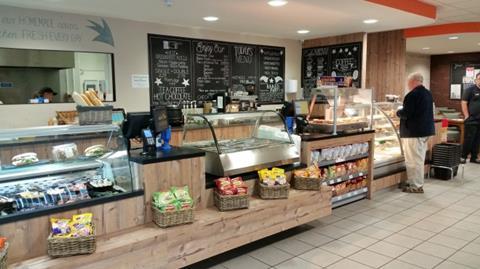
Opened last November, the Falkirk site is David Sands’ second David’s Kitchen operation and follows its success in his flagship Glenrothes store, which launched in 2014.
The concept of David’s Kitchen is a fine balance between retail and foodservice: “We’re trying to create a c-store, a Greggs, and a Subway offering – all of it without spreading ourselves too thin,” says David.
“All of our recipes were developed by a chef. We work to prescribed recipe cards and that’s the challenge,” he adds. “Everybody thinks that they can add their own mark to the recipes, but we’re very clear that they mustn’t – a recipe is a recipe.”
Hot breakfast rolls come served with bacon, haggis, Lorne sausage and black pudding, while hot meals include lasagne, hot pots, chicken curries, macaroni cheese and stovies. There are also baked potatoes, homemade soups, baguettes, sandwiches, wraps, paninis, salad, chips and pasta. The cooks come in in the morning and decide what to make based on the previous day’s sales.
“That’s the benefit of having your own kitchen,” says David. “The reality of ordering fresh food in Scotland is that you order on day one for a day three delivery. Anything can happen in between – for one thing we have such variable weather. It’s not easy.”
The food-to-go part of the business relies on high margins. “You have to think of yourself as running a catering operation. It’s completely different to retail,” says David. “The margins have to be much higher because the labour content is higher. You have to look at 70-80% gross profit because 30% of that is wage costs.”
Falkirk is essentially a new and improved version of its older sister. “We thought we’d over-engineered the counter at the original Glenrothes store, but we actually ended up needing to expand it from six metres to seven, which is the maximum the space allows for,” says managing director Keith Fernie. “So we’ve made the Falkirk branch’s counter just over eight metres. At 400sq ft, we’ve also made the back area bigger so that staff have more space to prep the food. And we decided to make a glass window running the length of the kitchen so that customers can watch staff preparing their food. This helps them understand what David’s Kitchen is about.”
Another improvement to the offering at Falkirk is the addition of seating. “I know that there are stores in the UK that have seating, but it’s not quite accepted in convenience stores yet in the same way as it is in Dublin,” says David. “We want people to feel comfortable to come in and sit down and use wi-fi and have a cup of coffee and a bite to eat.”
There are eight members of staff working in the kitchen, and dishes are prepared from when the counter opens at 6am. Hot food closes at 6pm and sandwiches are available until 8pm. The busiest period is between 11am and 2pm.
Company director Diane Greenough states that on a good week, turnover is £4,500 (excluding bakery products, which accounts for an additional £1,200). “Baguettes are our best-sellers,” she adds. “We sell about 40 or 50 a day. Sweet chilli chicken is the top seller.”
The team is already eyeing up the next opportunity. “The next thing we are looking to introduce is hot rolls,” says Keith. “We already do sausage and bacon rolls, but we’re installing a new oven which will enable us to heat items within a minute.”
Pierre’s
Nisa Fletton, Peterborough
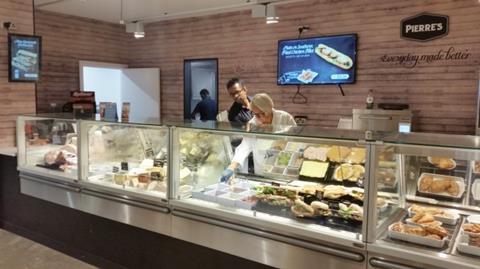
There’s no missing the six-metre Pierre’s deli counter, which was a key part of a £180,000 refit at Nisa Fletton, owned by Siva Theivanayagam. Wood-effect back boards are adorned with a decorative script and vibrant media screens flag up all the menu options.
The store has only been open a week when C-Store comes to visit but the counter already looks the part, even though it is set to benefit from a further finishing touch in the form of suspended lighting. (The initial fitting was too heavy for the ceiling, but is being installed later this month). This store is one of only three Pierre’s counters from Aryzta Food Solutions in the UK and the concept was launched in the past seven months.
“Before, we had a smaller three-metre long deli counter,” explains Siva. “It was made up of one-metre hot food, one-metre meat and cheese, and one-metre sandwiches. It was very popular and a key reason why people came here, so we knew that we wanted it to be a major focus of the store when we carried out the refit.”
The old counter turned over 150 baguettes a day, and Siva is confident that this can be improved on now. “Having more space allows us to introduce more premium bread products, as well as a much wider range of meats and cheeses.”
The cheese offering is supplied by local firm Cheese Plus, which is well known in the area and supplies everything from a Driftwood goat’s cheese log from Somerset to a local blue called The Duke.
As a result of having a larger counter, Siva is increasing staff numbers on the deli counter. “Before, we’d have two people manning the deli in the morning and one in the afternoon; now we need four in the morning and two in the afternoon.”
Plans are also in place to introduce further hot foods. “We want everything made outside and then brought in. It’s a lot of work to produce dishes in-house,” says Siva. “I’ve spoken to a curry house in Peterborough and they’re going to supply us with several dishes carrying their branding. I am also getting a firm to provide us with pizza bases, which the deli staff can provide toppings for.”
Staff are being trained in how to run the counter by Mandy Gill, retail concept specialist for the Midlands at Cuisine de France, part of Aryzta Food Solutions.
“We’re trying to emulate Subway,” she says. “Customers can choose their own bread carriers. Before, there was a grab-and-go breakfast bap offering, but serve-over is new for this store. The emphasis is on promoting freshness. It works well as you see all the fresh produce at the front of the store as you walk down the first aisle and then you come here to the freshly-prepared food.”
She claims that being able to make bread products to order offers the store a real point of difference: “Not everywhere can make a sandwich in front of people,” she says.
However, the company is careful to ensure that the offering isn’t overly labour intensive. “It’s a deli ethos, but you don’t need to meet as many environmental health requirements,” she says. “Sandwiches are made fresh, while pastries and chicken are delivered frozen and heated in-store.”
For customers looking for a hot drink or snack, there’s a vibrant coffee station at the entrance. The machine carries the ‘Seattle’s Best Coffee’ brand, part of Starbucks Coffee Company. This is flanked by a pastry stand and Otis Spunkmeyer cookies and muffins supplied by Cuisine de France on the other.
Chalet Cuisine
Chalet Costcutter, Portadown, Armagh
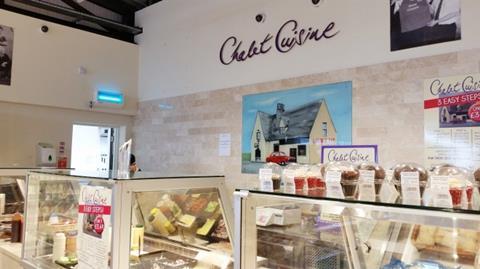
In 2014 a disused village pub was knocked down and rebuilt as a 3,000sq ft Chalet Costcutter in Portadown, County Armagh. The store boasts a 5.5m deli counter selling a host of freshly-cooked meals. The rebuild and refit cost £300,000, with the deli and kitchen area accounting for one-third of the spend.
“Our customer base is a mix of upper, middle and working class,” says store manager Craig Crossey-Truesdale (pictured). “We have 20 staff, 11 part-time and nine full-time.”
The menu is produced on a monthly basis and is adapted to minimise store wastage. “There will be two or three must-have dishes and then we leave it up to the girls to choose the rest,” says Craig. “It depends on what’s on the shop floor nearing its date.”
Chicken curry is the counter’s best-seller. “We sell 90 a week,” he says. “We used to make it on rotation with other dishes, but we’ve just run a trial where we made it available every day for four weeks and it still sold well, so it’s now a daily dish.”
The deli recently attempted an evening food-to-go offering in the form of a chicken and burger bar but, sadly, it didn’t take off. “We let it run for four months, and we spent money publicising it, but customers just didn’t care,” says Craig.
Instead, the team focused their efforts on making their morning and lunchtime offerings more enticing. “The team takes an open-minded approach to the menu. If we’re on Facebook or out and see a nice meal, we take a photo and send it to the girls and within a couple of hours it’s made up and we do a tasting with customers,” says Craig. “In terms of hot food, there are six main dishes a day in addition to chicken goujons and chips. We make curries, chicken chunks with sauce, stroganoff, pies and so on.”
In addition, staff now make better use of existing equipment. The deli was equipped with a £4,000 Merrychef oven, which has ultra-short cook times, but until recently it wasn’t being used. “Sue, who took charge of the deli counter five months ago, has created a three-step poster to encourage customers to get their food heated,” says Craig. “We also now sell 16 types of cooked bread a day, including paninis and ciabattas.”
The quality of the food is so high that it has earned the store loyal customers and business was largely unaffected by a competitor setting up a hot food offering. “The Spar over the road opened a deli a while ago, but we lost only £50 in the first week and then it went back to normal,” says Craig. “It’s a different quality of food that they’re producing. Their policy is heat and eat, whereas here everything is cooked from fresh.”
While overall the deli counter is a great success, bringing in £2,500 a week, Craig has to keep a close eye on the figures to ensure that it earns its place in-store. An in-depth analysis of individual dishes revealed that a few meals were making a loss because staff weren’t controlling portions properly. “It was costing too much to sell particular dishes, so we’ve had to remove some, such as lasagne, altogether,” says Craig. “We will bring the dishes we’ve removed back into line over time and then return them.”
Despite charging a 50% margin on deli produce, the high labour cost means that the deli is not a big money-maker, but Craig says that’s not its purpose. “The deli is a draw, but it’s the additional items that customers buy that make the money.”
.That’s how many chicken curries the store sells each week.















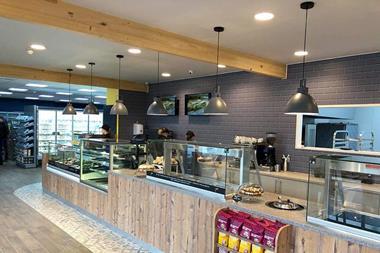
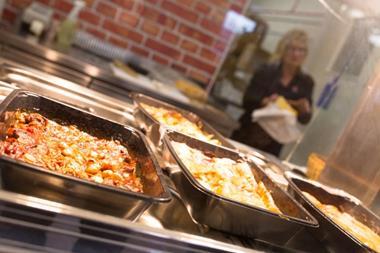
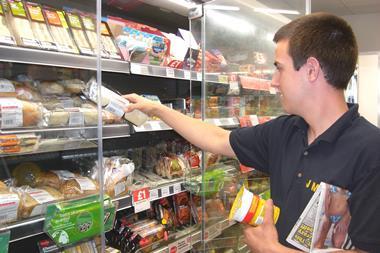
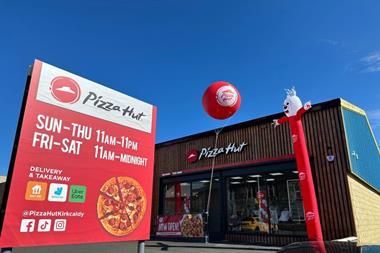
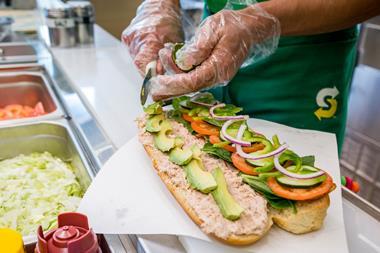
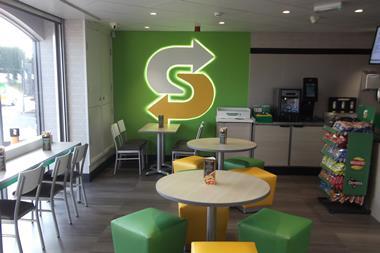
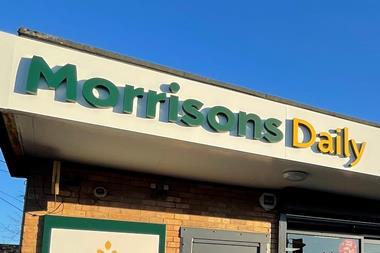
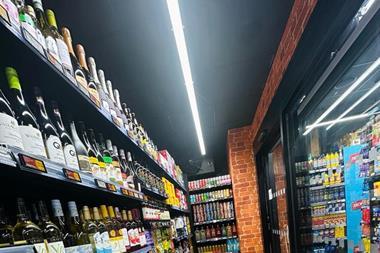
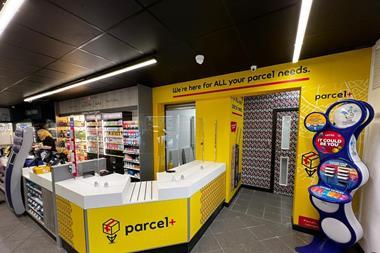

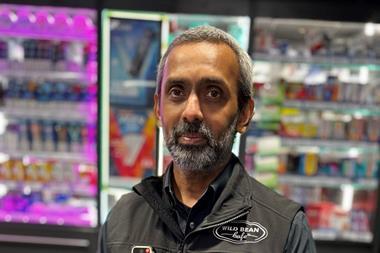
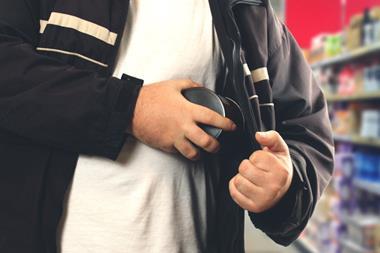
No comments yet